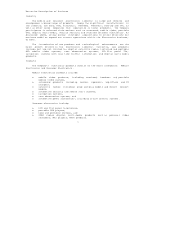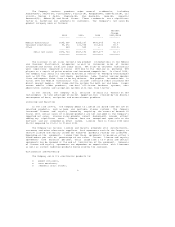Audiovox 2004 Annual Report Download - page 20
Download and view the complete annual report
Please find page 20 of the 2004 Audiovox annual report below. You can navigate through the pages in the report by either clicking on the pages listed below, or by using the keyword search tool below to find specific information within the annual report.subject to legal proceedings and claims for alleged infringement by us, our
suppliers or our distributors, of third party's patents, trade secrets,
trademarks or copyrights.
Any claims relating to the infringement of third−party proprietary rights,
even if not meritorious, could result in costly litigation, divert management's
attention and resources, or require us to either enter into royalty or license
agreements which are not advantageous to us or pay material amounts of damages.
In addition, parties making these claims may be able to obtain an injunction,
which could prevent us from selling our products. We may increasingly be subject
to infringement claims as we expand our product offerings.
Fluctuations in Foreign Currencies or United States Dollar Could Have a Material
Adverse Impact on Our Business.
We cannot predict the effect of exchange rate fluctuations on our future
operating results. Also, due to the short−term nature of our supply
arrangements, the relationship of the U.S. dollar to foreign currencies will
impact price quotes when negotiating new supply arrangements denominated in U.S.
dollars. As a result, we could experience declining selling prices in our market
without the benefit of cost decreases on purchases from suppliers or we could
experience increasing costs without an ability to pass the costs to the
customers. We cannot assure you that we will be able to effectively limit our
exposure to foreign currencies. Foreign currency fluctuations could cause our
operating results to decline and have a material adverse effect on our ability
to compete. Many of our competitors manufacture products in the United States or
outside the Pacific Rim, which could place us at a competitive disadvantage if
the value of the Pacific Rim currencies increased relative to the currency in
the countries where our competitors obtain their products.
Trade Sanctions Against Foreign Countries or Foreign Companies Could Have a
Material Adverse Impact on Our Business.
As a result of trade disputes, the United States and foreign countries have
occasionally imposed tariffs, regulatory procedures and importation bans on
certain products produced in foreign countries. Trade sanctions or regulatory
procedures involving a country in which we conduct a substantial amount of
business could have a material adverse effect on our operations. Some of the
countries we purchase products from are: China, Japan, South Korea, Taiwan and
Malaysia. China and Japan have been affected by such sanctions in the past. In
addition, the United States has imposed, and may in the future impose, sanctions
on foreign companies for anti−dumping and other violations of U.S. law. If
sanctions were imposed on any of our suppliers or customers, it could have a
material adverse effect on our operations.
We May Not Be Able to Sustain Our Recent Growth Rates or Maintain Profit
Margins.
Sales have increased significantly from $276.5 million for fiscal 2000 to
$567.1 million for fiscal 2004. We may not be able to continue to achieve this
overall revenue growth rate or maintain profit margins because, among other
reasons, of increased competition and technological changes. In addition, we
expect that our operating expenses will continue to increase as we seek to
expand our business, which could also result in a reduction in profit margins if
we do not concurrently increase our sales proportionately.
If Our Sales During the Holiday Season Fall below Our Expectations, Our Annual
Results Could Also Fall below Expectations.
Seasonal consumer shopping patterns significantly affect our business. We
generally make a substantial amount of our sales and net income during
September, October and November, our fourth fiscal quarter. We expect this trend
to continue. December is also a key month for us, due largely to the increase in
promotional activities by our customers during the holiday season. If the
economy faltered in these periods, if our customers altered the timing or
17
























